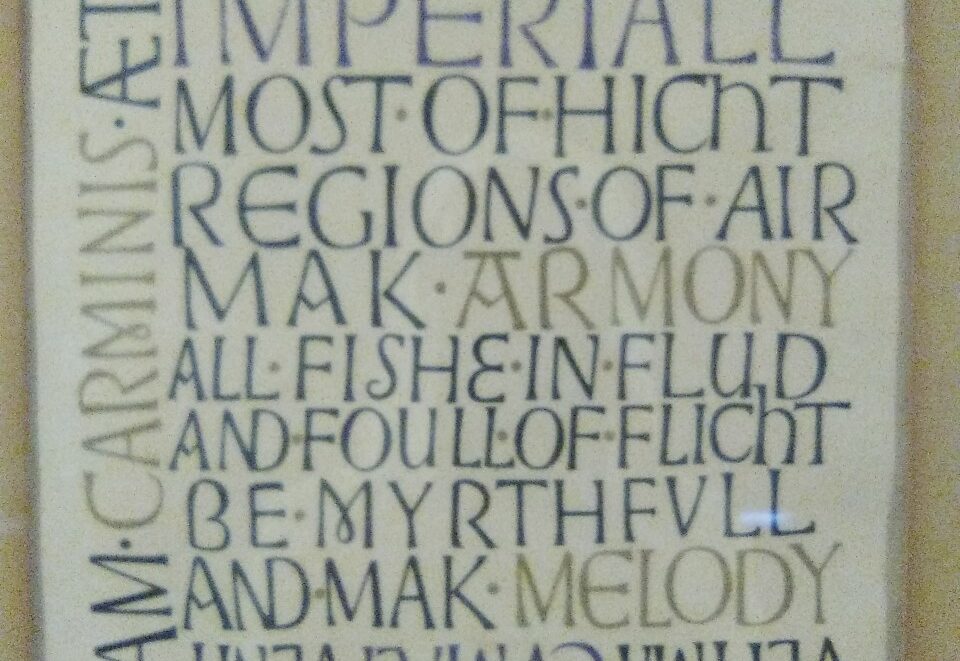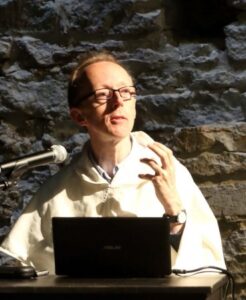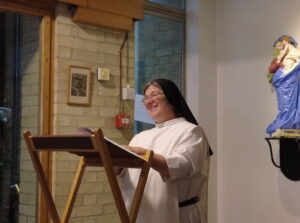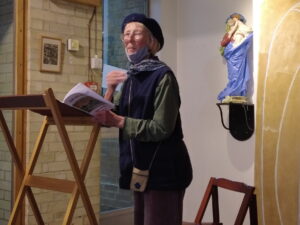
During the in-person period of the exhibition we held a special Poetry Evening for The Feast of the Holy Archangels (Michaelmas), 29th September, which is also the Patronal Feast of Blackfriars Priory. David Jones’s poetry, which is recognised as some of the greatest poetry of the twentieth century but is not an easy read, was made much more accessible to us by Dr Elizabeth Powell of the University of Durham. Elizabeth is the author of David Jones and the Craft of Theology: Becoming Beauty (London: Bloomsbury, 2020). Watch Elizabeth’s lecture The Maker’s Journey: A Study of David Jones’s Wood-Engravings for ‘The Book of Jonah’.
Elizabeth’s lecture was followed by poetry from the wider Cambridge Dominican community:
Sr Ann Catherine Swailes
Sr Ann Catherine is Assistant University Catholic Chaplain and a theologian, working especially on theology of suffering. Sr Ann Catherine writes,
“These poems were written over a period of years for the annual creative Stations of the Cross evening at Fisher House, the Roman Catholic Chaplaincy to Cambridge University. The last of the three, composed for this year’s event, was written in memory of Mgr Mark Langham, chaplain to the University who died in January.”
Station VII:
Jesus Falls a Second Time (Lent 2019)
“The soldiers struck him rudely, and he fell several times”.
The first time and the third, one gets the thing. Too readily perhaps. Our clichés tug and shriek
Where hush would more befit a dying God, and yet our quest for comfort makes us speak
Or else we veil our heart-stunned silence and our stupid doubt within abstraction, figuring, and trim
Enumeration of our sacraments. First fall: that’s like confession, and the last, that’s him
Prostrating at the altar wrought from gallows by his glance.
But this unpatterning of pattern, this pointless mid-point, repetitious, shapeless dance
Partnered by dirt and shame, of wobbling feet on dizzy sun-stabbed dust, as down he folds again.
Squaddies drum bored fingers at the halt, flick innuendo at the tribes he made
To light their nations. It makes no sense. His ragged limbs can’t stand. Omnipotence lies powerless, limp, and splayed.
What rubric could encapsulate this pain?
What liturgy could make this horror sing?
Only the eternal work of holy love, that brings the Mind of God to sup
And drink his people’s chaos every spring,
And, stumbling with us, thereby raise us up.
Station X
Tumbling from the rose-gold threaded clouds,
on wayside blossom frothed as taffeta;
on solitary white garbed early swan in sudden bloom upon the river near
the jonquil-tapestried collegiate grass;
the robe of light descends from endless day
enfolding all the city in its springtime play.
And Jesus is stripped of his garments.
Quivering, tottering, peeled
raw before the blinding gaze of blood-steeped men,
behold the Man, behold in him ourselves.
In every naked terror of our sweating nights,
in every burning skirmish with our shame
in every breathless, silken, rustling fall
of our defenses as we risk love’s name
He is stripped. Divested of all comeliness and charm,
stumbling a genuflection as he mounts
the darkening altar at the noontide hour,
behold our great high priest, behold in him ourselves.
The glory is departing from him. Set aside
in sweat clogged dust, unnoticed and apart
that chasuble is rolled, that bore the sun,
and moon and constellations , heraldry divine.
Till in the frozen emptiness of a God’s death
Till we, in our confusion, grief and fear,
for comfort cuddle in it, find our lost hearts there.
Jesus is stripped of his garments.
In this, our lovely, mocking Cambridge spring,
Jesus is stripped.
And we, who stripped him, we in him are clothed.
Behold, behold our God. Behold, in him, ourselves.
Now, in the place where he was crucified, there was a garden.
The signs of contradiction everywhere.
Seed pods in high boughs roost, as last year’s leaves
Rattle their small deaths, and berries cling
Withered to blunted thorns, like jellied pearls
Of blood, flung by the ebb of life.
Embroidered branches sweep with taunting grace
An invitation to the dance; the rite and riot of a callous spring.
I stumble to the stone, and try to feel,
Shiver, and strain for meaning, but I can’t. Words fail me,
Since the Word has failed; rushed tombwards with the corpse
He’s fastened to, the chalice drained, and dried.
I want and dread what lies beyond the seal
The empty, and impermeable cold in there
A sterile, starless nightfall, not the slumbering womb,
The only promised softness, ooze and rot.
And yet – what if I could hoist back the rock and see
His form, curved, lovely in the earth’s embrace,
As loosed among the dead he goes, a light that sings
Of conquering flesh; coordinates the choirs
Of roaring angels, terrorising hell;
Uproots me from the stinging, choking clay
Of shame, and plants me in his own heart’s tender soil.
What if I saw, as he sees, the sun’s rise
Refracted in the crystal drops that bead
The hedges after sudden shower with sheen
And sweetness? What if I could sense
The delicate new wine poured for the feast
He bids me to, the chalice brimmed, and bright?
Sr. Ann Catherine’s Station VI (“Veronica”), has been set to music by Fr Dominic – you can listen to it here.
Julia Dale
Julia Dale’s poetry is inspired especially by her travels in India, and by her work on the Middle English poem The Pearl. Her poetry has appeared in various publications including The Shop and White Adder Press, and she has translated from Bengali (Songs by Tagore), Catalan, Spanish and Middle English. Julia is a member of the Blackfriars congregation.
So There
From Julia’s collection Cow Dust Hour: Poems from India (2021).
6 am. The sun
tidies her misty veil,
blinks through them.
Made it again, she smiles
a little wanly.
My bench, stone
cold
under my bones
protests. Ridiculous
today, in such a style
to entertain
such thoughts…
But in its granite back a speck of quartz –
just one,
caught as the solar gaze
widens its allure –
is suddenly, impossibly, ablaze
as any Kohinoor.
Out of Sequence
margarita,
all who have searched for you
dived deep for you
roamed far waters
watching for you
have known
the child’s voice;
the diver’s hand grasped
the edge of the rock
felt you shining out of reach
the fishers’ boats grew old
with patient waiting for what
they often thought they saw
all heard
some time
the child’s voice:
“mad men,
you cannot possess me,
go back to your world.”
margarita
margosa,
all who have dreamed of you
wake to their loss.
(A later version of this poem appears as one of those accompanying my translation of Middle English ‘Pearl’)
In Response
the silence
at the end, when
we’re gathered
into the household,
the treasury, all
and each in their own way
a pearl,
like a song
beyond songs, the silence
like a dance that
need never end
beyond question
and answer
Watch this space for information on Julia’s new collection of poems!
Michael Withey
Dr Michael Withey is a specialist of ancient Greek philosophy and we recently had the joy of his Baptism and Confirmation at Blackfriars. His first language is Welsh, and he draws special inspiration from the Welsh landscape.
Two Sonnets
A Painter by the Mill-Pond
And by the weir, she sat and plucked the day.
Quick hand set fast that wilding light: enthrals
That streaming course, wax-wane its wind’ling way –
Mask played for mask, its rule a child’s – now falls
From time and into place. That light, each stroke
Corrals into its serried ranks; demands
Each flitting shade now bear its earth-weight yoke,
Fast-coloured, there take root and rest; commands
Them wake from may’s becoming dream, soon strewn
On sterile wastes of time. Still sings the stream
Its babble vain – “can’t step here twice!” – course hewn
And set beneath that grinding wheel – strange deme
A wet-nurse serves, there grows: so antic day
Moves still, where frolic hand bid rest in play.
Lucifer
Of course you love the dark: you brought the light.
On hire: no shame, you’re just too poor to buy,
And cut to fit your modest frame: still night
Applauds your pomp, bright-borne shoot in sterile sky:
You lost yourself in that applause. Day’s host,
Your role, announce the acts, rouse up the crowd
Then from the wings, see them watch engrossed:
The show’s star turn. Noon’s splendour, still your shroud
That cast you back into that sightless deep
Obscure – where once you ruled; he took your place.
His gift, to rouse the world, held fast in sleep
To show itself, its hues; illuming grace:
You scorned in wearing: better then you’d dwell
Creation’s crown, sole light in dusk’s dark swell.
Dominic White
 Fr Dominic is Bursar of Blackfriars, Cambridge, and a Senior Fellow of the Margaret Beaufort Institute of Theology. As a theologian of the arts he finds theology and the arts mutually nurturing: the arts are one of the sources of his theological reflection, and his theological reflection often opens out into poetry and music where ordinary language reaches its limits.
Fr Dominic is Bursar of Blackfriars, Cambridge, and a Senior Fellow of the Margaret Beaufort Institute of Theology. As a theologian of the arts he finds theology and the arts mutually nurturing: the arts are one of the sources of his theological reflection, and his theological reflection often opens out into poetry and music where ordinary language reaches its limits.
St. Michael’s, Cambridge
The evening light at Blackfriars is very special, softly illuminating the Bauhaus-style cloister. I wrote this poem on a visit some years ago, before moving here.
I no longer see this creation
Through glass darkly of another’s eyes,
Nor silently watch the yellowing walls
Of their memory;
But am here, now,
Real presence of evening’s angelic light.
Michael, here where we rest in grace of your battle,
When will you lighten Capricorn’s black moon,
Shadow cast by falling Wormwood,
Lodestar of sorrow even where faith is sure?
Could there be a moment,
Glimpsing through the veil to the sanctuary restored,
Where angelic choirs
Dancing to the rhythm of the saints
In Wisdom’s fragrance –
When the shadow might lift,
Burnt away by memory of light stronger,
Serene Fire?
Anima Sitit / My soul thirsts
I didn’t write this poem by Fr Grégoire Laurent Huyghues-Beaufond OP, but was asked to translate it. It was been specially commissioned as the lyrics of a choral work by Peter Uusberg for the Dominican Arts Days in Tallinn, Estonia, in September 2021. His first collection of poems, Chambres avec vues (“Rooms with Views”) composed doubly in Latin and French, was published last year by Cheyne. Of course, you can’t translate a poem – poetic language is by nature too dense. So you have to compose a new poem based on the old one. Here I worked with the possibilities afforded by both the Latin and French originals and the sounds and associations that could emerge in English.
1
the vine of heaven
no one guards,
grapes of light
burning of wine
fruit of stars:
that is my delight
R/ let the stars be my thirst
2
so deep the night
so cold I was
neither stars
nor fire
could warm me:
only fever’s memory
R/ my soul burns at the memories
3
libation of milk
on the sea’s deep,
or of grain in this
vast heaven:
so do the stars
for my thirsting soul
R/ may my desire drink the stars
4
when the night overshadows
the waters, the land and my body
she illumines,
calls out
the vast abyss
of my heart’s thirst.
R/ in the very depth of my soul
there, my thirst
5
violent my heart
beats to me,
anguishes me to
count the stars:
like one who thought himself
shepherd of the heavens
R/ the night of my soul
the ewe’s thirst
6
I made the journey
amid the stars’
dusty snow
I went, crying out
my desire
under the deep night
R/ my soul’s thirst
the dawn to drink
Easter 2021
for Zlata and Sr Rose
After hoping against hope that we could celebrate Easter together in 2020 – only to find a very different kind of Resurrection– celebrating it this year as the whole Church was a beautiful gift of such richness. Easter Sunday was a particularly lovely spring day, with nature in full blossom.
It started with the angels in the sanctuary,
suspending their dance before human gaze:
disguised as flowers
not frozen in this warming spring, but
supple in stop motion,
Life breaking
For this is the marvel:
His body is now all in all, nature lives, all lives in Him.
What must it be like to live thus, to be Him, to be so much life?
To know all, love all, from this still centre?
Chōra choreuōn
space dancing
Can we know, live this, we who must turn back our lingering gaze
from sun-exultant tree to everyday?
Yet still, after tortuous Lent, then the straits of Holy Week,
Glorious in the night
we glimpse
Resurrection faces:
delight of
Christ between us
to die for
DW, 7 April 2021, updated 9 September 21


